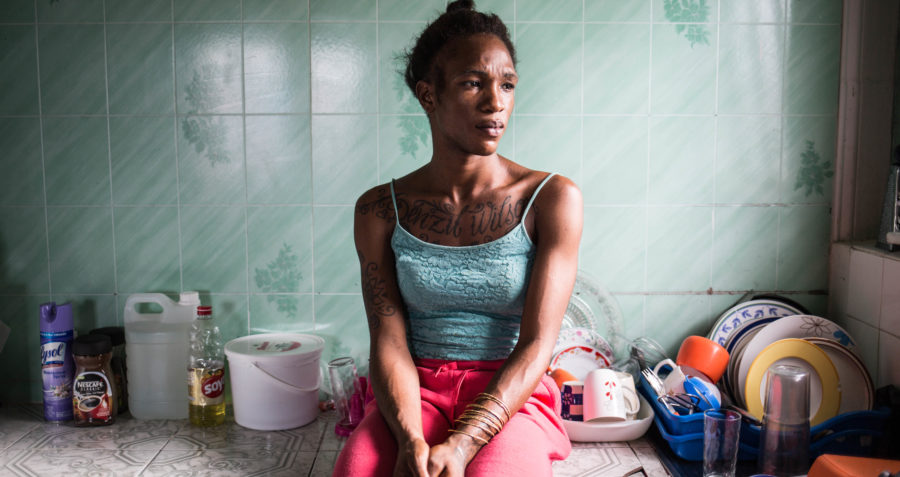AIDS 2020: Five key takeaways for human rights in the time of COVID-19
 © Jason Florio for Frontline AIDS
© Jason Florio for Frontline AIDS
Alongside this year’s International AIDS Conference, Frontline AIDS and our partners hosted two virtual side events to focus conversation on the human rights impacts of COVID-19 and what the new pandemic means for marginalised communities and progress on HIV prevention. Here are five key takeaways.
1. Human rights violations are increasing during COVID-19
Lesbian, gay, bisexual and transgender (LGBT) people and organisations are being targeted under the guise of COVID-19 restrictions and other new legislation put in place during lockdown. We heard from Adrian Jjuuko of Human Rights Awareness and Promotion Forum in Uganda, and Richard Lusimbo of Pan-Africa ILGA, about the recent attacks on, and arbitrary arrest and detention of, 20 young LGBT people from a shelter in Uganda, under the excuse of non-compliance with social distancing. In Uganda, LGBT people are also being blamed for COVID-19 itself.
LGBT people and organisations are also being left out of national COVID-19 responses because their needs are not seen as essential and in many countries community-based organisations are not recognised as essential services providers. Applications to the Rapid Response Fund, which provides emergency financial to support people in need, have tripled since the start of the crisis, mostly because lockdown restrictions ignore the additional vulnerabilities of the LGBT community. This includes LGBT refugees in Kenya and Malawi being excluded from COVID-19 responses.
2. Civic space is shrinking
Achievements made in the fight to end the HIV and AIDS epidemic are at risk because of shrinking space for civil society, and this is being compounded by the COVID-19 crisis. A joint report launched at the conference by PITCH and CIVICUS – Activism and AIDS: protect civil society’s space to end the epidemic – highlights the risks and restrictions facing civil society, using trends and case studies from four countries – Zimbabwe, Ukraine, Indonesia, and Vietnam.
The report puts a spotlight on how, in many countries, civil society’s efforts are being impacted by increasing populism and ultra-conservatism. In many cases, governments and law enforcement agencies are making it dangerous for civil society to serve the communities they represent, including those most at risk of and living with HIV.
Chester Samba, of Gays and Lesbians of Zimbabwe, described the role of the media in closing civic space in Zimbabwe – where civil society is being painted as trying to topple the government – leading to a climate where civil society leaders are being arrested and human rights work essentially criminalised.
3. Communities are adapting, and rapidly finding ways to respond
On the positive side, community organisations have been able to rapidly adapt and offer flexibility in responding to the COVID-19 pandemic and the new reality it has created.
The Alliance for Public Health (APH) in Ukraine has adapted the REAct tool to COVID-19 by taking its interventions online, with strategies like using Tinder to reach people with legal and social support. Ordinarily, the REAct tool is used to document human rights violations, but APH’s Victoria Kalyniuk explained the challenge of measuring rights violations during COVID-19, when it was not clear what rights are protected during emergencies. APH is now training lawyers with knowledge on this.
Frontline AIDS’ Rapid Response Fund has also widened its scope, from its previous focus on LGBT people, to now also take applications from people who use drugs and sell sex, as well as adolescent girls and young women in need of support, during COVID-19.
4. Donors and the international community should ensure support to communities that meetS basic needs
There were resounding and repeated calls for donors to take a holistic approach to supporting marginalised communities during COVID-19. People need not only legal support but food and shelter, access to HIV medications, and sometimes relocation, through a humanitarian approach. The impact of only a handful of donors being willing to fund work to meet these basic needs is already being felt by the LGBT community and needs to be addressed for the mid-to long-term; this pandemic is not going away any time soon.
Activists urged the international community to help by building capacity to challenge human rights violations, give legal assistance, and mental health support for activists. Community-led organisations need to be recognised as essential service providers by governments so that they can operate during lock downs and get access to humanitarian provisions, like PPE.
5. Communities are still not at the centre of the response
We very much welcome the strong call from the Dutch Ambassador Women’s Rights and Gender Equality, Mette Gonggrijp, that “we need more [activists from the community] at the decision table…encourage other donors to make the same smart investments to protect human rights and people’s access to the health system.”
But we must question why this is not already the case, in the midst of a global pandemic with many parallels to the HIV response.
This year’s HIV 2020 conference has made a list of 10 recommendations to the International AIDS Society, to focus minds on the message that true progress can only be led with communities at the centre of the response.
The Partnership to Inspire, Transform and Connect the HIV response (PITCH) is a joint partnership between Frontline AIDS, Aidsfonds and the Netherlands Ministry of Foreign Affairs.
Tags
COVID-19Human rightsPITCH


